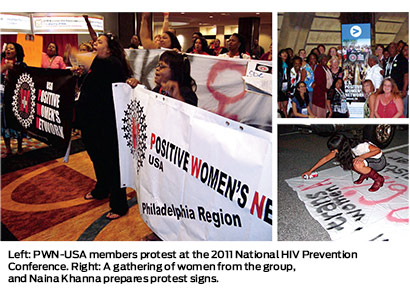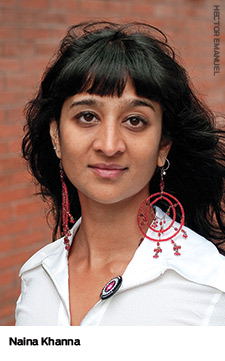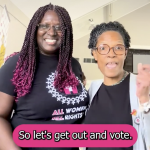 Naina Khanna is the executive director of the Positive Women’s Network United States of America (PWN-USA), a national membership group of HIV-positive women. PWN-USA builds leadership among women living with the virus. The group also advocates for social justice and human rights that support HIV-positive women.
Naina Khanna is the executive director of the Positive Women’s Network United States of America (PWN-USA), a national membership group of HIV-positive women. PWN-USA builds leadership among women living with the virus. The group also advocates for social justice and human rights that support HIV-positive women.
Khanna has been a member of the President’s Advisory Council on HIV/AIDS (PACHA) since 2010. She also has served on the coordinating committee for the Coalition for a National AIDS Strategy and the board of directors for AIDS Alliance for Children, Youth and Families. Previously, Khanna was the national field director for the League of Pissed Off Voters, a progressive group.
She shares her thoughts on PWN-USA becoming an independent group, on its new survey on sexual and reproductive health issues for women living with HIV, the future of PWN-USA and what keeps her motivated in the fight against the virus.
Tell us about PWN-USA and your work.
Over the last 30 years, the epidemic has become a lot more feminized, racialized and impoverished. As a result, 28 very diverse women living with HIV from all over the country founded PWN-USA in 2008. The women were young and old, cisgender and transgender, as well as non-native English speakers.
Our four-part strategy consists of eliminating stigma, building leadership, mobilizing advocates and creating policy change. We work to eliminate stigma through media accountability work, and producing communications that centralize women living with HIV as the experts on their own lives.
We build leadership with trainings all over the country in person, online and over the phone. We also provide technical assistance for leaders, as well as support and nurture them. We mobilize through strategy sharing, organizing campaigns and increasing our focus on regional organizing. We also do advocacy in coalition with other groups.
Why did PWN-USA become an independent organization?
When PWN-USA was founded, Women Organized to Respond to Life-threatening Diseases (WORLD) agreed to be a structural umbrella to support our launch. WORLD has a long history of being a pioneer for women with HIV. We were very proud to be a part of that.
It was always the vision that PWN-USA would be its own independent autonomous entity. We worked hard for the first four and a half years to get to the point where we felt ready to take that step. In early 2013, we were excited to become our own organization.
We have our own board of directors that is entirely made up of women with HIV. The people we employ are accountable to our mission and our constituents. We have more flexibility to focus on our mission creating sustainable solutions for women living with HIV on the policy level, but also on the practical level.
What did you learn from your sexual and reproductive health survey?
As part of a project to look at the whole landscape of sexual and reproductive rights of women living with HIV in the United States, we released a policy scan and literature review and conducted original research. We surveyed nearly 200 women around the country with questions nobody else was really asking.
When we reviewed the literature, we found that when anybody studies the sex lives of women living with HIV, it’s mostly in the context of preventing vertical or horizontal transmission [i.e., mother to child or woman to partner]. Nobody’s asking things like how does HIV impact the way you feel about your body, choosing partners and negotiating prevention.
For example, we asked respondents if providers had mentioned viral suppression as a prevention strategy. Although 96 percent of respondents were in care and 80 percent of them were on antiretrovirals, many of those virally suppressed, over half of them had not been told. You have to wonder how engagement and the care continuum might look if that was information people were consistently getting.
What are your group’s future goals?
We went through an extensive strategic planning process in 2013. We listened to our constituents, stakeholders and allies—while still centralizing it around women with HIV—to determine our plans for the next two years.  You can expect to see an increased focus on supporting organizing on the state and local level. We’ve done a lot of federal advocacy over the last few years, but we realized that our politics are local in many ways. There are so many important issues, including HIV criminalization, playing out state by state. We are going to be increasing technical assistance, tools and resources for state and local advocates.
You can expect to see an increased focus on supporting organizing on the state and local level. We’ve done a lot of federal advocacy over the last few years, but we realized that our politics are local in many ways. There are so many important issues, including HIV criminalization, playing out state by state. We are going to be increasing technical assistance, tools and resources for state and local advocates.
Looking forward, we realized the work we do is very intersectional. The lives of people living with HIV are multidimensional, and it’s critical to move beyond HIV. In the next few years, we will increase participation on issues related to reproductive justice and economic justice, making sure the HIV community is more represented.
We’ll continue to focus on how we can address the intersectional issue of trauma and HIV for women. The rate of post-traumatic stress disorder (PTSD) among women living with HIV is about 30 percent, which is about six times the PTSD rate for all women. I suspect those rates could potentially be higher for LGBT folks living with the virus or for older HIV-positive people.
We’ll also continue to do media accountability work that we’re calling the “Stamp Out Stigma” campaign to address instances of HIV stigma in the media. We’ll be partnering to build a rapid response network of people prepared to address those instances.
We will be holding our first national advocacy leadership summit for women living with HIV. It will be held in the South but will be for women nationwide to come up with concrete tools and provide trainings on specific skills to help build advocacy capacity.
How did you get involved in HIV/AIDS advocacy?
I was diagnosed with HIV in 2002. In 2003 and 2004, I was active with the League of Pissed Off Voters. We lost, but I was part of founding the group, which still works to build power among young people of color in the electoral process. I was an activist, but I was pretty silent around my HIV in the first few years after my diagnosis.
I had asked to get tested for HIV twice before I was actually tested. I was told I didn’t need a test, and that was a common thing I heard about women and testing. When I first was told I needed to get on medication, I asked about my options if I wanted to get pregnant. The treatment advocate didn’t have the information I needed.
After I got involved in WORLD and their community of women living with HIV, I started to understand that these experiences were all too common.
What keeps you motivated in your work?
I work with the most badass and fierce group of women I have ever known. I have so much respect for every single one of them. They inspire me every day to not just keep in the work but to do it better, to do more or to do it differently.
We want a world where women with HIV are valued, where there is justice for everyone with or vulnerable to HIV, and where our rights are upheld. As long as there are things like criminalization laws and discrimination of any kind against people with HIV, as long as there is gender inequality or there is violence, there will be a need to continue the work.
The struggle for justice has to place the experiences of people at the center of solutions.
Sister Solidarity
Positive Women’s Network USA executive director Naina Khanna advocates for self-empowerment.






2 Comments
2 Comments